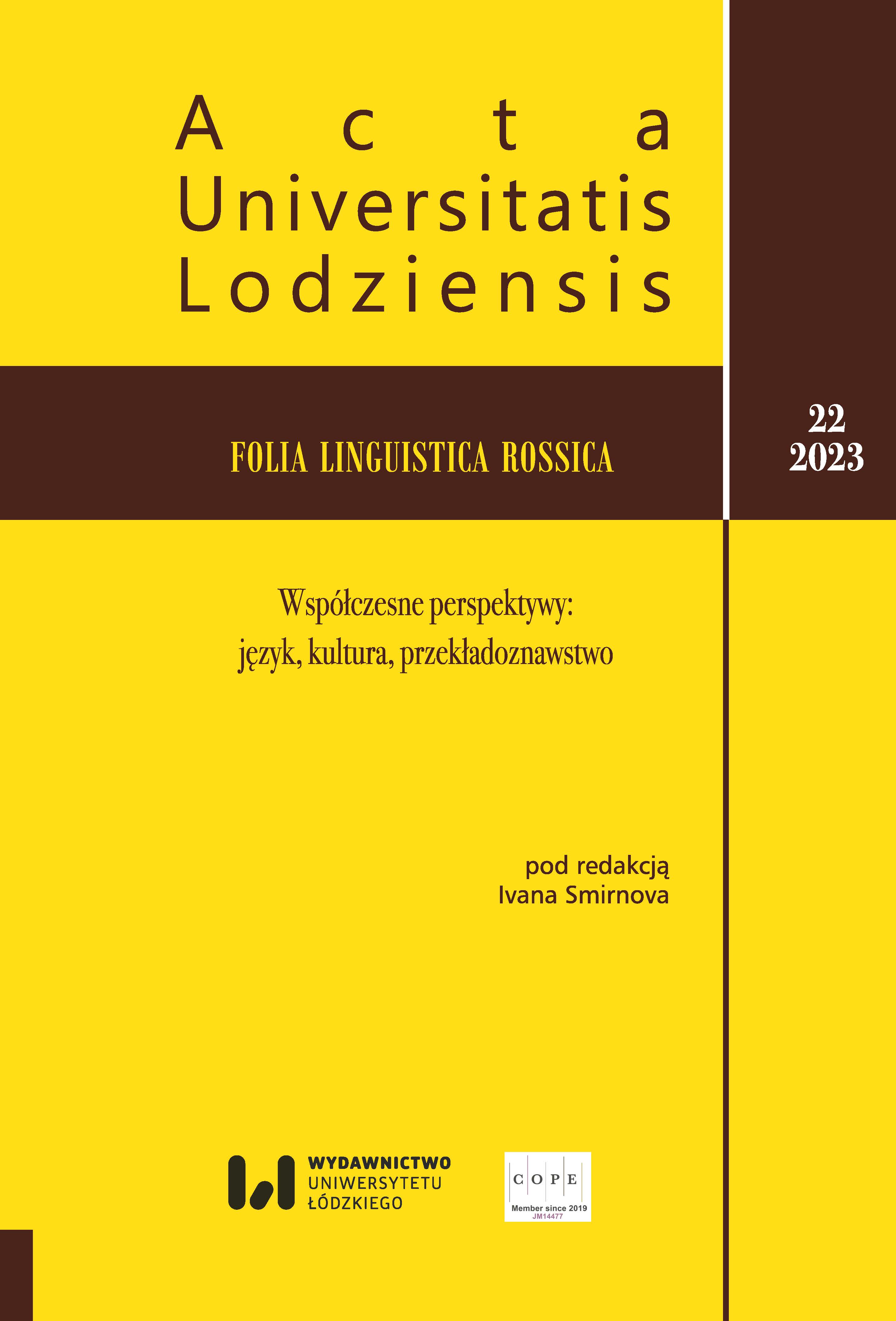Развитие языка позитивных эмоций в русскоязычном интернет-пространстве (на основе исследования выбранного контента Instagram, VK и YouTube)
DOI:
https://doi.org/10.18778/1731-8025.22.11Słowa kluczowe:
русский язык, интернет-пространство, язык эмоций, коммуникация в интернете, тенденции развития русского языкаAbstrakt
В статье рассматриваются изменения тенденций выражения эмоций в русскоязычной онлайн-среде. Основной целью было выявление языковых средств, которые используются при общении в интернет-пространстве.
Основными методами, которыми мы пользовались, были метод наблюдения, методы сплошной выборки, метод систематизации и описания языкового материала. В статье мы после определения особенностей данной среды и характерных для нее способов коммуникации выдвигаем гипотезу, что в период с 2010 по 2023 гг. наблюдается переход от склонности пользователей интернета к выражению негативных эмоций либо сокрытию своих чувств к более позитивному и открытому отношению к собственным эмоциям.
Собранные данные позволяют не только подтвердить гипотезу, но и указать, что с 2018 по 2019 год, то есть с момента, по нашим наблюдениям, а также подтверждения их статистическими данными, начала большей заинтересованности пользователей ментальным здоровьем, стали образовываться новые языковые средства, а также активное заимствование (в различной форме) психологических терминов из иностранного интернет-пространства и их интенсивное использование.
В конце статьи выдвигается предположение, что данная тенденция может быть связана с уровнем эмоционального интеллекта среднестатистических молодых пользователей.
Данные статьи могут послужить базой для дальнейших междисциплинарных исследований.
Bibliografia
Дзялошинский, И. (2013). Медиапространство России: сущность и основные характеристики. B: Развитие русскоязычного медиапространства: коммуникационные и этические проблемы: материалы научно-практической конференции (26–27 апреля 2013 г.) (330–345). Мocквa: АПК и ППРО
Google Scholar
Евстафьева, Е. (2023). 50 полезных аффирмаций на каждый день, https://lifehacker.ru/affirmacii-na-kazhdyj-den/ доступ: 20.04.2023.
Google Scholar
Изотова, Е. (2014). Инструменты эмоциональной насыщенности интернет-сообщения: эмоциональный интеллект и способы кодирования эмоций. Психологические исследования, 7 (3), https://psystudy.ru/index.php/num/article/view/593/691 доступ: 20.04.2023.
Google Scholar
DOI: https://doi.org/10.54359/ps.v7i37.593
Как безопасно сообщать о своих чувствах партнеру, https://mindspa.me/как-безопасно-сообщать-о-своих-чувств/ доступ: 20.04.2023
Google Scholar
Камалова, А.A., Берестнев, Г.И. (2019). Эмоции как предмет лингвистического изучения (на материале русского языка). Przegląd Wschodnioeuropejski, 10 (2), 349–360.
Google Scholar
Мозговая, А. (2017). Эмотивные маркеры интернет-коммуникации (на примере интернет-сервиса Instagram). Филологические науки. Вопросы теории и практики, 2 (68), 125–129.
Google Scholar
Мозговая, А. (2018). Средства манифестации эмоций в Интернет-коммуникации. Вестник МГЛУ. Гуманитарные науки, 13 (807), 125–138
Google Scholar
Новоселова, Ю. (2023). Зрелая любовь: 9 признаков зрелости в отношениях, https://yasno.live/blog/priznaki-zreloj-lyubvi доступ: 29.04.2023.
Google Scholar
Пильгун, М. (2013). Особенности формирования контента в русскоязычном медиапространстве. B: Развитие русскоязычного медиапространства: коммуникационные и этические проблемы: материалы научно-практической конференции (26–27 апреля 2013 г.) (262–271). Мocквa: АПК и ППРО.
Google Scholar
Тарса, Я. (2021). Способы выражения положительных эмоций в Интернете. Stylistyka, 30, 163–176.
Google Scholar
DOI: https://doi.org/10.25167/10.25167/Stylistyka30.2021.9
Dzyaloshinskii, I. (2013). Mediaprostranstvo Rossii: sushchnost’ i osnovnye kharakteristiki. B: Razvitie russkoyazychnogo mediaprostranstva: kommunikatsionnye i eticheskie problemy: materialy nauchno-prakticheskoi konferentsii (26–27 aprelya 2013 g.) (330–345). Moscow: APK i PPRO.
Google Scholar
Evstaf’eva, E. (2023). 50 poleznykh affirmatsii na kazhdyi den’, https://lifehacker.ru/affirmacii-na-kazhdyj-den/ accessed: 20.04.2023.
Google Scholar
Guerini, M., Staiano, J. (2015). Deep Feelings: A Massive Cross-Lingual Study on the Relation between Emotions and Virality. V: WWW ’15 Companion: Proceedings of the 24th International Conference on World Wide Web, Association for Computing Machinery (299–305). New York, https://doi.org/10.1145/2740908.2743058
Google Scholar
DOI: https://doi.org/10.1145/2740908.2743058
Izotova, E. (2014). Instrumenty emotsional’noi nasyshchennosti internet-soobshcheniya: emotsional’nyi intellekt i sposoby kodirovaniya emotsii. Psikhologicheskie issledovaniya, 7 (3), https://psystudy.ru/index.php/num/article/view/593/691 accessed: 20.04.2023.
Google Scholar
Kak bezopasno soobshchat’ o svoikh chuvstvakh partneru, https://mindspa.me/kak-bezopasnosoobshchat’-o-svoikh-chuvstv/ accessed: 20.04.2023.
Google Scholar
Kamalova, A.A., Berestnev, G.I. (2019). Emotsii kak predmet lingvisticheskogo izucheniya (na materiale russkogo yazyka). Przegląd Wschodnioeuropejski, 10 (2), 349–360.
Google Scholar
DOI: https://doi.org/10.31648/pw.5486
Mozgovaya, A. (2017). Emotivnye markery internet-kommunikatsii (na primere internet-servisa Instagram). Filologicheskie nauki. Voprosy teorii i praktiki, 2 (68), 125–129.
Google Scholar
Mozgovaya, A. (2018). Sredstva manifestatsii emotsii v Internet-kommunikatsii. Vestnik MGLU. Gumanitarnye nauki, 13 (807), 125–138.
Google Scholar
Novoselova, Yu. (2023). Zrelaya lyubov’: 9 priznakov zrelosti v otnosheniyakh, https://yasno.live/blog/priznaki-zreloj-lyubvi accessed: 29.04.2023.
Google Scholar
Pil’gun, M. (2013). Osobennosti formirovaniya kontenta v russkoyazychnom mediaprostranstve. V: Razvitie russkoyazychnogo mediaprostranstva: kommunikatsionnye i eticheskie problemy: materialy nauchno-prakticheskoi konferentsii (26–27 aprelya 2013 g.) (262–271). Moscow: APK i PPRO.
Google Scholar
DOI: https://doi.org/10.13109/kize.2013.26.2.262
Tarsa, Ya. (2021). Sposoby vyrazheniya polozhitel’nykh emotsii v Internete. Stylistyka, 30, 163–176.
Google Scholar
DOI: https://doi.org/10.25167/Stylistyka30.2021.9
Pobrania
Opublikowane
Wersje
- 2024-02-29 - (2)
- 2023-12-30 - (1)
Jak cytować
Numer
Dział
Licencja

Utwór dostępny jest na licencji Creative Commons Uznanie autorstwa – Użycie niekomercyjne – Bez utworów zależnych 4.0 Międzynarodowe.









